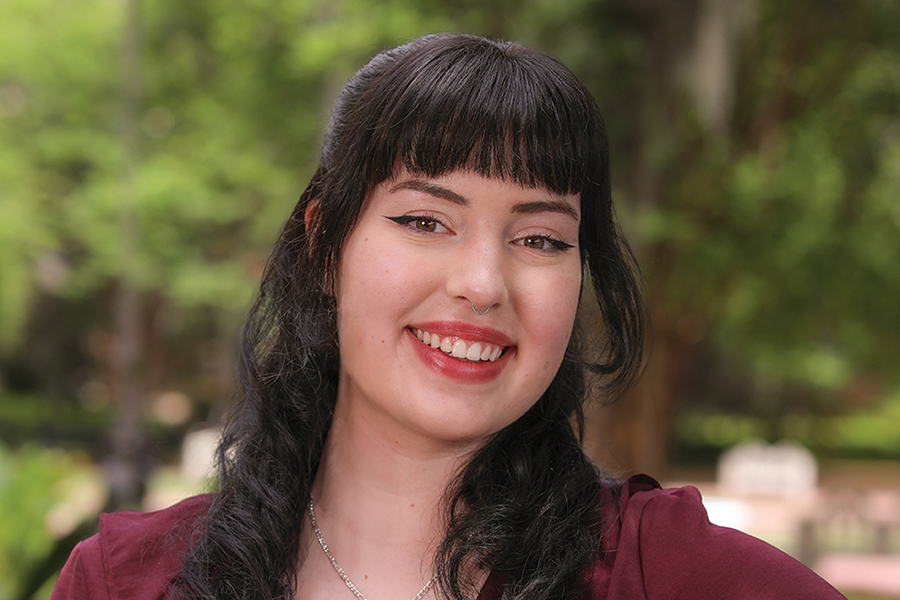Linguistic Literacy
Undergraduate Avery Bixler researches the benefits of bilingualism for learning and for life

Aprender — to learn. Hablar — to speak. Leer — to read. Entender — to understand. These are some of the infinitives that define Avery Bixler’s study at Florida State University where the rising junior is pursuing dual degrees in linguistics and languages, through the Department of Modern Languages and Linguistics, and in communication disorders through the College of Communication and Information.
Linguistics as a field bridges the humanities and sciences by scientifically examining how language — one of the strongest elements uniting individuals and societies — shapes and is shaped by the structure and processing functions of the brain. It draws on expertise from cognitive psychology and neuroscience and helps us understand how people interact, how they acquire and use language, and how language acquisition impacts individuals throughout their lives.
Bixler, who speaks English and Spanish fluently, originally came to Tallahassee from Tampa to study cyber criminology but made a switch after taking Psycholinguistics of Bilingualism, a course exploring language and cognition in bilingual individuals.
“For me, bilingual research was the most compelling aspect of linguistics,” Bixler said. “For example, speaking one or more languages can have as much benefit as exercise in terms of fighting off the effects of Alzheimer’s disease, and children who speak more than one language tend to perform better on executive function tasks than their peers who speak just one language.”
Bixler began studying Spanish in high school and continued working on her fluency with a job at the Florida Bar where she staffed the Spanish language help line to help connect community members to attorneys or other resources. The role also enhanced her understanding of dialectical differences among a language’s speakers.
The need for language assistance, particularly with Spanish, is also important to research activity. Bixler, who had already participated in a project through FSU’s Undergraduate Research Opportunity Program, looked for a way to both expand her research résumé and provide critical support to principal investigators.
Through the FSU Career Center’s InternFSU program, which provides high-impact experiential learning opportunities for undergrads, Bixler landed a research assistant position at the Cabell Lab in the Florida Center for Reading Research. FCRR is an interdisciplinary research center that investigates reading and reading-related skills and aims to advance the science of reading to improve the learning and achievement of children from birth through adulthood.
“The Cabell Lab, led by associate professor of education and FCRR research faculty member Sonia Cabell, focuses on preventing literacy difficulties, specifically through vocabulary and knowledge building, for English-speaking, Spanish-speaking and Spanish-English bilingual children,” Bixler said. “The lab identifies ways to promote literacy and help students with the potential to struggle.”
In her role, Bixler worked on a project that sought to determine the impact differences that reading and vocabulary curricula and class size have on the learning outcomes for Spanish-English bilingual children.
“It was my job to watch videos and record the length of child utterances, the type of questions teachers asked, and the way children interacted with their Spanish-speaking parents,” Bixler said. “This research targets children with language limitations who may be more prone to reading difficulties as they approach reading age. The hope is this research provides information on how to help every child learn to read and give teachers the tools to improve outcomes.”
Rebecca Vasile, a second-year doctoral student in reading education and language arts working in the Cabell Lab, was impressed by Bixler’s contributions and is glad she will be returning to the lab this fall after spending the summer abroad studying in Spain.
“Avery has taken this opportunity very seriously during her internship in the way she engages with our team, asks pertinent questions, and doesn’t hesitate to add to discussions around coding,” Vasile said. “With her willingness to soak up the knowledge and experiences in our lab, Avery has the makings to become a talented researcher."
Bixler is also a research intern for the Child Language and Literacy Lab, part of the Language and Literacy Lab in the FSU School of Communication Science and Disorders. Under the direction of associate professor Carla Wood, she focuses on morphology, the study of words’ internal structure.
“I translated videos into Spanish designed for English-as-a-Second-Language learners,” she said. “This project targets grammar and looks to use a child’s first language to teach them about their second. I helped to design the videos that will be used in the research project.”
Following her planned graduation from FSU in 2026, Bixler hopes to remain in Tallahassee for graduate school in preparation for a career in speech-language pathology.
